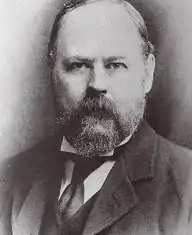Basil Harwood
Basil Harwood (11 April 1859 – 3 April 1949) was an organist and composer in the English church music tradition, best known today for his liturgical works, particularly his anthem O How Glorious is the Kingdom (1898) and his Service in A flat (1892), which still remain popular in English churches. He wrote numerous hymn tunes, several of which became well-known including Luckington ("Let All the World in Every Corner Sing") and Thornbury ("O Jesus I Have Promised" and "Thy hand, O God, has Guided").
Basil Harwood | |
|---|---|
 | |
| Background information | |
| Birth name | Basil Harwood |
| Born | 11 April 1859 Woodhouse, Gloucestershire, England |
| Died | 3 April 1949 (aged 89) London |
| Genres | Organ music; choral music |
| Occupation(s) | Organist and composer |
| Instruments | Organ |
| Years active | 1883–1939 |
Early life
Basil Harwood was born on 11 April 1859 at Woodhouse, Olveston, Gloucestershire, the youngest child of Edward Harwood (1818–1907), a banker.[1] His mother Mary, née Sturge (1840–1867), was of Quaker extraction, and Harwood was brought up in that faith until a switch to Anglicanism in 1869 following his father's second marriage.[1]
Education
As a boy, Harwood attended Walton Lodge preparatory school in Clevedon, followed in 1864 by Charterhouse.[1] In 1876 he won a scholarship to Trinity College, Oxford, where he was placed in the second class in classical moderations (1879) and the third in modern history (1881).[1] He took his music degree (BMus) in 1880, studying with C. W. Corfe, then the university's Choragus[1] (assistant to the professor of music).[2]
After Oxford, Harwood spent a year in Leipzig studying composition with Jadassohn and the organ with Papperitz.[1]
Career
Harwood's first professional position was organist of St Barnabas', Pimlico in 1883, a post he held until 1887.[3] He then served as organist at Ely Cathedral for five years, followed by a final move to Oxford in 1892 where he remained organist of Christ Church Cathedral until his retirement in 1909.[3][1]
He became Doctor of Music (DMus) in 1896, submitting as his doctoral work a setting of Psalm 86, Inclina domine.[1]
During his time in Oxford Harwood acted as conductor of the Oxford Orchestral Association (1892–8), and became the first conductor of the Oxford Bach Choir in 1896.[1] He held the position of Precentor of Keble College between 1892 and 1903, and was Choragus at the University from 1900 until his retirement.[3][1] He edited The Oxford Hymn Book (1908)[1] as well as acting as an Oxford examiner for several academic years between 1900 and 1915.[3]
Works
Harwood's musical works sit within the 'English' tradition established by Wesley, Stainer, Parry and Stanford.[1] He is best known today for his liturgical works, particularly his anthem O How Glorious is the Kingdom (1898) and his Service in A flat (1892), which still remain popular with English choirs.[1] He wrote numerous hymn tunes, several of which became well-known including Luckington ("Let All the World in Every Corner Sing"), Thornbury ("O Jesus I Have Promised" and "Thy hand, O God, has Guided"), and St Audrey ("Sing ye Faithful, Sing with Gladness").[4][1]
He produced a number of choral works, often for church festivals, including Inclina Domine (Gloucester Festival 1898); As by the Streams of Babylon (Oxford Bach Choir 1907); Jesus, Thy Boundless Love (St Paul's Cathedral 1909); Song on May Morning (Leeds Festival 1913); Love Incarnate (Gloucester Festival 1925); Ye Choirs of New Jerusalem (Gloucester Festival 1928); and Sacrifice Triumphant (1939).[3]
Harwood's organ style was distinctive and technically challenging.[1] He made significant contributions to the repertory of English Romantic music with works requiring considerable virtuoso technique such as Sonata no.1 in C sharp minor op.5, Dithyramb op.7, and Toccata op.49.[4] His love of plainchant and hymn tunes is often evident in his organ works.[1]
Personal life
Harwood was deeply religious and was said to have had a quiet, gentle, and reserved personality.[1] On 27 December 1899 he married one of his former pupils, Mabel Ada Jennings (1871–1974). The couple had two sons, John Edward Godfrey (born 1900) and Basil Anthony (born 1903).[1] In 1909 Harwood took early retirement and returned to Gloucestershire to manage his family estate there.[4]
In 1936 Harwood and his wife moved to London, where they remained except for some temporary absences in Bournemouth and then Shiplake during the war.[1] Harwood died on 3 April 1949 at his home in Courtfield Gardens, Kensington, aged 89.[1] His ashes were interred in St Barnabas's Church, Pimlico.[1]
References
- Dibble 2004.
- "Choragus". Encyclopædia Britannica. 1911.
- Who's Who 2007.
- Dibble 2001.
Bibliography
- Dibble, Jeremy (20 January 2001). "Harwood, Basil". Grove Music Online. doi:10.1093/gmo/9781561592630.article.12494.CS1 maint: ref=harv (link)
- Dibble, Jeremy (23 September 2004). "Harwood, Basil (1859–1949)". Oxford Dictionary of National Biography (online ed.). Oxford University Press. doi:10.1093/ref:odnb/33749.CS1 maint: ref=harv (link) (Subscription or UK public library membership required.)
- "Harwood, Basil". Who's Who 2020. 23 September 2004. doi:10.1093/ww/9780199540884.013.U226553.CS1 maint: ref=harv (link)
External links
- Free scores by Basil Harwood at the International Music Score Library Project (IMSLP)
- Free scores by Basil Harwood in the Choral Public Domain Library (ChoralWiki)